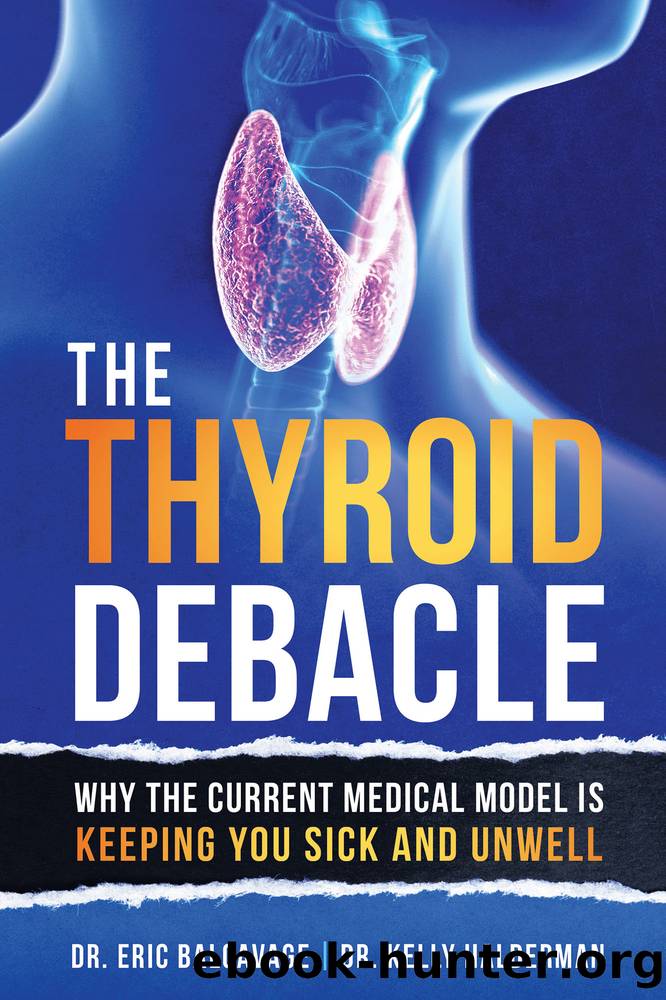The Thyroid Debacle by Dr. Eric Balcavage & Kelly Halderman

Author:Dr. Eric Balcavage & Kelly Halderman [Balcavage, Eric & Halderman, Kelly]
Language: eng
Format: epub
ISBN: 9798765227985
Publisher: Balboa Press
Published: 2022-06-07T04:00:00+00:00
CHAPTER 12
INTERPRETING THYROID LAB TESTS
This chapter is not meant to make you a master at understanding and interpreting thyroid blood test results. Instead the purpose is to give you a sense of how to interpret them and, more importantly, to help you understand why you need more than TSH and T4 blood tests. I hope it becomes clear that interpreting blood test results involves more than just looking for H for high or L for low on your lab report. A thyroid panel of blood tests on its own is simply not enough to explain the complexity of your thyroid physiology problems.
READING VERSUS INTERPRETING
People often assume that lab tests are easy to interpret, but interpretation can be a complex process. Blood test results are easy to read if all you are trying to do is identify whether lab values are out of their reference ranges. In the allopathic model, the results are often reviewed for values that fall above or below the reference range. If the lab value is within the reference range, it is normal. An abnormal result is a value above or below the reference range. This is when an allopathic physician often prescribes medication to bring the value into the reference range. Doing that isnât interpreting a test result; itâs reading a number. Your blood test results are not the problem; they are a reference for what is happening in your body. They are signs of health or signs of a problem.
Interpreting blood test results is a bit of an art, and how well a doctor interprets them is based on his or her skill set and knowledge base. Interpretation involves looking at every lab value in conjunction with a personâs history, signs and symptoms, medications, supplements, and other tests. First, a doctor must consider whether the lab value is normal or abnormal, appropriate or inappropriate for each patient. The next step is to identify why the lab value is what it is. Lastly, the doctor determines the best way to address the cause of the abnormal result.
You donât need an ounce of biochemistry training to read a lab report. The average doctor can read your report and prescribe a drug or supplement that might bring a lab value back into the lab reference range. If there are no abnormal high or low values, your test results are considered normal. You are told that everything is normal and that you are healthy. It takes an exceptional doctor to interpret your lab values, determine strategies to address the root cause of abnormal ones, and restore your health and quality of life using as few medications or supplements as possible.
Functional medicine practitioners, whose goal is to identify and address root-cause issues, must do more than look for high or low lab values. We must interpret patientsâ test results. If not, we arenât doing our job.
Replacing Medications with Supplements Isnât the Answer
Both functional medicine practitioners and people looking for a functional medicine approach must understand that a supplement for
Download
This site does not store any files on its server. We only index and link to content provided by other sites. Please contact the content providers to delete copyright contents if any and email us, we'll remove relevant links or contents immediately.
| Administration & Medicine Economics | Allied Health Professions |
| Basic Sciences | Dentistry |
| History | Medical Informatics |
| Medicine | Nursing |
| Pharmacology | Psychology |
| Research | Veterinary Medicine |
Machine Learning at Scale with H2O by Gregory Keys | David Whiting(4284)
Fairy Tale by Stephen King(3358)
Will by Will Smith(2892)
Hooked: A Dark, Contemporary Romance (Never After Series) by Emily McIntire(2538)
Rationality by Steven Pinker(2344)
Friends, Lovers, and the Big Terrible Thing by Matthew Perry(2208)
The Becoming by Nora Roberts(2179)
Love on the Brain by Ali Hazelwood(2046)
The Strength In Our Scars by Bianca Sparacino(1832)
HBR's 10 Must Reads 2022 by Harvard Business Review(1828)
A Short History of War by Jeremy Black(1827)
Leviathan Falls (The Expanse Book 9) by James S. A. Corey(1722)
A Game of Thrones (The Illustrated Edition) by George R. R. Martin(1699)
515945210 by Unknown(1655)
Bewilderment by Richard Powers(1604)
443319537 by Unknown(1539)
The 1619 Project by Unknown(1450)
The Real Anthony Fauci: Bill Gates, Big Pharma, and the Global War on Democracy and Public Health (Childrenâs Health Defense) by Robert F. Kennedy(1392)
Works by Richard Wright(1325)
